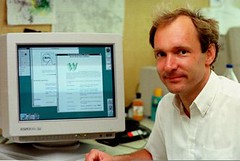While an independent contractor at CERN, Switzerland, in 1980, Berners-Lee proposed a project based on the concept of hypertext, to facilitate sharing and updating information among researchers, says Wikipedia. While there, he built a prototype system named ENQUIRE. After leaving CERN, in 1980, he went to work at Image Computer Systems Ltd., but he returned to CERN in 1984 as a fellow. In 1989, CERN was the largest Internet node in Europe, and Berners-Lee saw an opportunity to join hypertext with the Internet: "I just had to take the hypertext idea and connect it to the TCP and DNS ideas and — ta-da! — the World Wide Web."[3] He wrote his initial proposal in March of 1989, and in 1990, with the help of Robert Cailliau, produced a revision which was accepted by his manager, Mike Sendall. He used similar ideas to those underlying the Enquire system to create the World Wide Web, for which he designed and built the first web browser and editor (called WorldWideWeb and developed on NEXTSTEP) and the first Web server called httpd (short for HyperText Transfer Protocol daemon).
The first Web site built was at CERN[4][5][6][7] and was first put online on 6 August 1991. It provided an explanation about what the World Wide Web was, how one could own a browser and how to set up a Web server.
Berners-Lee's parents, both mathematicians, were employed together on the team that built the Manchester Mark I, one of the earliest computers. They taught Berners-Lee to use mathematics everywhere, even at the dinner table.
He is an alumnus of The Queen's College, Oxford, where he played table tennis for Oxford, against rival Cambridge. While at Queen's, Berners-Lee built a computer with a soldering iron, TTL gates, an M6800 processor and an old television. During his time at university, he was caught hacking with a friend and was subsequently banned from using the university computer. He graduated in 1976 with a degree in physics.
Subscribe to:
Post Comments (Atom)


No comments:
Post a Comment